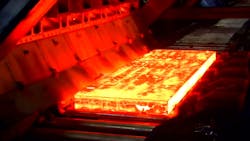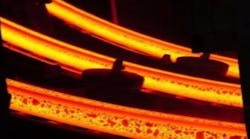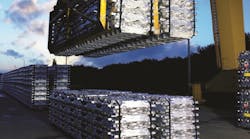Analysts: Nippon Steel Investment Pledge Could Skew Market
The $14 billion that Nippon Steel Corp. executives have pledged to pump into the operations of U.S. Steel Corp. could weaken the U.S. steel market, two analysts noted this week—with one of them saying steel fundamentals are “in free fall.”
Both Gordon Johnson of GLJ Research and Chris LaFemina with Jefferies spoke of the sector’s struggles in announcing downgrades of shares of Cleveland-Cliffs Inc., which they say is particularly exposed to drops in the price of steel. Such a slide has become more likely, they wrote, now that Nippon Steel has committed to a far greater investment in U.S. Steel capacity than most observers had expected and the probability is growing that other foreign producers will also invest to grow their U.S. operations.
In a note to his firm’s client, LaFemina said he had expected Nippon Steel would invest $3 billion into U.S. Steel’ operations as part of its bid to buy the Pittsburgh-based company. Adding more than $10 billion to that figure—which includes plans for a new mill—in order to win the approval of President Donald Trump “would likely negatively affect medium-term steel market fundamentals as it could lead to higher volumes and lower costs,” LaFemina wrote.
Driven both by a drop in demand from automotive customers and high operating costs, Cleveland-Cliffs Chairman, President and CEO Lourenco Goncalves has in recent weeks started closing five of the company’s plants, moves that will mean laying off about 2,000 people. Johnson, who used the “free fall” phrase about the industry, said it’s telling—and not in a good way—that Cliffs is likely to produce an EBIT loss of more than $200 million this quarter despite steel prices rising smartly from the first three months of the year.
Shares of Cliffs (Ticker: CLF) slid from nearly $7 early in the week to below $6 on the heels of the analysts’ downgrades. Over the past six months, they have lost half of their value, a move that has cut the company’s market capitalization to about $2.9 billion.
About the Author
Geert De Lombaerde
Senior Editor
A native of Belgium, Geert De Lombaerde has been in business journalism since the mid-1990s and writes about public companies, markets and economic trends for Endeavor Business Media publications, focusing on IndustryWeek, FleetOwner, Oil & Gas Journal, T&D World and Healthcare Innovation. He also curates the twice-monthly Market Moves Strategy newsletter that showcases Endeavor stories on strategy, leadership and investment and contributes to other Market Moves newsletters.
With a degree in journalism from the University of Missouri, he began his reporting career at the Business Courier in Cincinnati in 1997, initially covering retail and the courts before shifting to banking, insurance and investing. He later was managing editor and editor of the Nashville Business Journal before being named editor of the Nashville Post in early 2008. He led a team that helped grow the Post's online traffic more than fivefold before joining Endeavor in September 2021.


